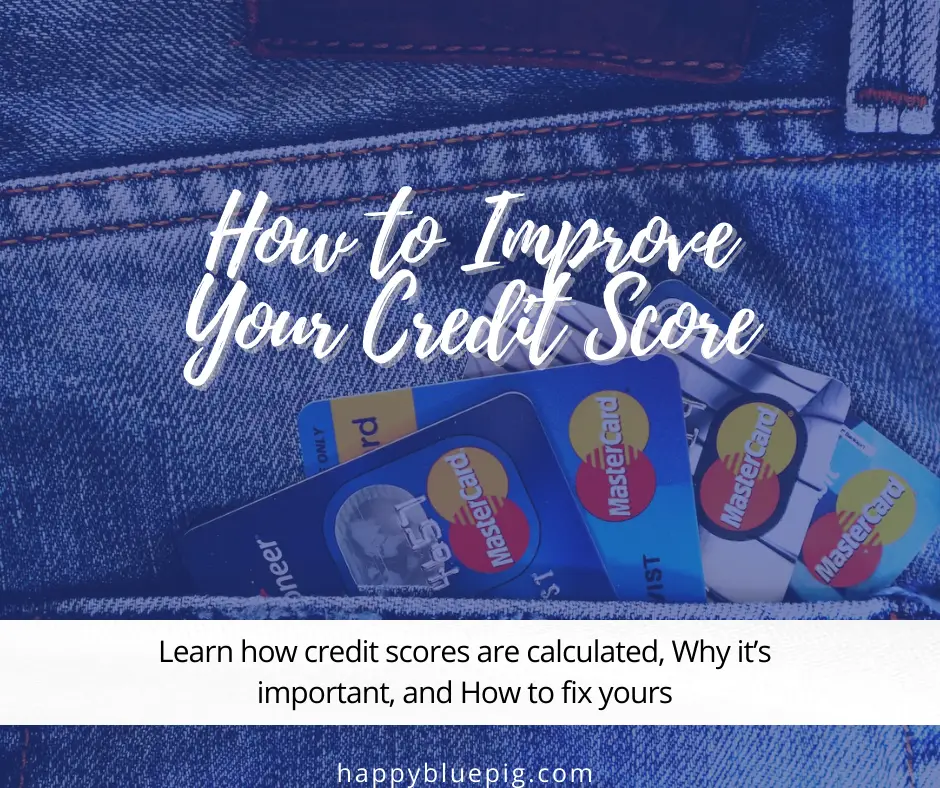What is a Credit Score?
If you have ever used credit in any form, such as credit cards or loans, you will have a credit report. A credit score is then calculated from the credit report. It is important to note that there are three major credit bureaus: Transunion, Experian, and Equifax. Because each report may contain different information, it is possible for you to have 3 different credit scores! Credit scores from all 3 credit bureaus take into account length of credit history, credit utilization (amount owed and available credit), mix of credit accounts, payment history, and new credit. By addressing each one of these categories, we can improve our score. So let’s dive in and take a closer look at each component of the credit score.
This post may contain affiliate links, which means I’ll receive a commission if you purchase through my links, at no extra cost to you. Please read full disclosure for more information.

Length of Credit History
Length of credit history simply means the age of your credit accounts. It takes into consideration the age of your oldest credit account, the age of your newest credit account, and the average age of all your accounts. Per Experian, this makes up 15% of the credit score calculation.
While this category does not give us any opportunity for a quick improvement in the credit score, it is important to understand it. It is beneficial for your credit score if you open a credit account while you are young, providing that you also pay the balance off in full each month! Another important consideration is when you are deciding what to do with a credit account that you no longer use. One of my oldest credit cards recently changed their benefits, and so I no longer use it. However, rather than closing the account, I have chosen to keep it open. Why? So that it continues to help increase the length of my credit history.
Credit Utilization
Credit utilization simply means the amount that you owe compared to the overall amount of credit available to you. This makes up a large part of your score; per Experian it is 30% of the credit score calculation. This is good news for us because this is also one of the components of the credit score that we can change quickly. Credit utilization is calculated both on individual accounts and as an overall calculation for all accounts. If your amount owed is greater than 30% of the total credit available to you, it will negatively impact your credit score. To improve your credit score, start by looking at each credit account and determine your credit utilization:
Credit utilization = Amount Owed / Credit Limit * 100
Do you have one or more credit accounts with credit utilization of over 30%? Start working to pay down those balances first in order to see a change on your credit score.
Payment History
Payment history makes up 35% of your FICO credit score. This is the largest and most influential category. Making the minimum payment on time is essential to keep a good score in this category. Missed and late payments, collections, and bankruptcy will negatively impact this category right away. Unfortunately, a missed payment will stay on your credit report for 7 years, so this category can take some time to improve. If you have an account or multiple accounts affected by this, the first thing to do is to bring them current. In particular, paying off a collections account could increase your score right away. Always be sure to pay on time, and if possible pay in full rather than the minimum payment.
Credit Mix

New Credit
Three Credit Score Myths
And now I’d like to address some myths about credit scores. This is actual advice my husband or I have received from well-meaning, but very uninformed friends and family. I’m sure you’ve heard some of these yourselves.
You need to carry a balance on your credit card to get a good credit score. Don’t pay it off in full each month.
First, you do not need to carry a balance on your credit card for a good score. Remember above where we talked about credit utilization? You get a better score for lower credit utilization (a.k.a. lower amount owed). There is no benefit to carrying a balance.
There is no way to get a good credit score when you are just starting out. It takes many years to get a good credit score.
It is true that for the first 6 months, FICO cannot calculate a credit score. But length of credit history is a relatively small part of the overall calculation. It is more important that you keep credit utilization low and make all payments on time. Will your score continue to improve over time as your length of credit history increases? Yes. Will you need years to achieve a good enough score to get that mortgage or qualify for that apartment? Absolutely not.
Checking your credit score will lower your credit score
Checking your credit score does NOT lower it. When you check your own credit score, or give someone like an employer or landlord permission to review your credit score, this is called a soft pull. A soft pull does not have any effect on your credit score.
And now I hope you have a better understanding of credit scores and what you can do to improve yours. Do you have any questions, comments, or Credit score stories you would like to share? Comment below or email me at [email protected]. I would love to hear from you!


